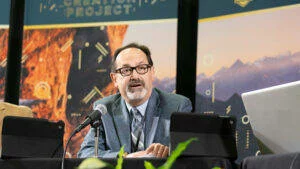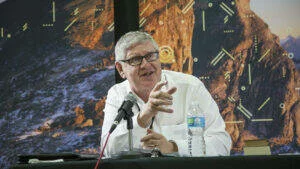 Like Paul Nelson did earlier in the series, I will briefly restate and number the main questions and address them in chronological order as they appear in Hans Madueme’s redirect.
Like Paul Nelson did earlier in the series, I will briefly restate and number the main questions and address them in chronological order as they appear in Hans Madueme’s redirect.
Why Me?
Question 1: Am I the exception that proves the rule? Why did I, as a former atheist and a naturalist, become convinced of ID arguments?
In my initial essay I already mentioned several reasons that could explain why more scientists have not yet embraced ID theory. Of course, the main reasons are that many scientists have never heard of ID arguments, or they have only heard caricatures of ID arguments, or they have never bothered to really study the arguments from the original sources instead of hostile propaganda. I was like that myself, and it was just the rare and lucky coincidence that I encountered original ID literature and arguments when I organized the 2009 Darwin Year exhibition in Germany.
But I think there is another important reason that points to a fatal flaw of modern university education: Most natural scientists nowadays are totally ignorant of 2,500 years of Western philosophy, and they often consider philosophy a useless enterprise that is not worth wasting time on. In a private conversation, a former colleague and evolutionary biologist from the Natural History Museum in Stuttgart once called philosophy nothing but “mental masturbation.” The sad consequence of this kind of prejudice is that most scientists are not aware how science presupposes philosophyAnother consequence is that scientists are unable to recognize that arguments against ID are often not based on empirical science but on fallacious armchair philosophy. (e.g., in terms of epistemology), and they do not realize when science transgresses its boundaries and enters the realm of (bad) philosophy, as in the self-refuting scientism and materialism that dominates much of modern academic discourse. Another consequence is that scientists are unable to recognize that arguments against ID are often not based on empirical science but on fallacious armchair philosophy (e.g., when critics claim that ID is not science because it is not falsifiable, and then also claim that it has been refuted by modern science).
I think this helps explain why I was more open to ID arguments than most of my colleagues. Even though I was neither a Christian nor a theist when I first considered ID, I had already abandoned metaphysical materialism and thus did not exclude a priori intelligent causation in nature. This was based on a ten-year-long intellectual journey to develop a coherent worldview that made sense of the evidences from modern science and the rational arguments from philosophy (e.g., philosophy of time, philosophy of mind, problem of universals). My journey began with an interest in modern physics (esp. quantum mechanics, relativity theory, string theory, and cosmology), which quickly led me to question and then reject materialism. I was for several years a proponent of Whiteheadian process thought, which David Ray Griffin called a naturalistic theism and a re-enchantment without supernaturalism.
Unfortunately, most of my colleagues in biology and paleontology are ignorant of the arguments from modern physics against materialism and still embrace an obsolete clockwork-universe view from the nineteenth century. Thus, to answer the question directly, why I arrived at ID and most other colleagues did not: Maybe because I was deeply interested in more than my own narrow field and looked beyond the naive flatland of Richard Dawkins. The rejection of materialism was a kind of pre-adaptation for my transition to ID, because under materialistic naturalism, ID is excluded a priori. Therefore, I think that the prevalent paradigm of materialism has to further erode before more scientists (especially biologists) will consider ID a reasonable alternative. And to the surprise of many biologists, the ultimate demise of materialism will come not from religion, but from the queen of all sciences, physics.
Concepts with Fuzzy Borders
Question 2: Is my view of ID as inference to the best explanation an overstatement in light of the demarcation criterion?
The fact that there is no universally agreed demarcation criterion for either science or for religion does not imply that there is no demarcation criterion between science and religion. While science as well as religion are concepts with fuzzy borders, they are in my view definitely not overlapping in any substantial way: Science is the systematic endeavor to explain the history and regularity in spatiotemporal nature, while religion is a philosophical (based on reason) and theological (based on revelation) quest to find an ultimate transcendent foundation for purpose and morality and to make sense of why we exist and what is our ultimate destiny.
No Theological Assumptions
Question 3: Does science involve a range of theological assumptions?
I strongly disagree that all fields of science involve a range of theological assumptions. Actually, none of them—including ID theory—require God or religion, and thus none of them involve any theological assumptions at all. The only exception is methodological naturalism, which is often mentioned as a core assumption of modern science, but indeed is nothing but an unjustified limitation imposed upon the spectrum of allowed explanations.Science is not another religion, but it is also not operating from a blank slate. It implies hidden assumptions and it requires philosophy as its foundation. One can and should dispense with methodological naturalism in science, and this by no means implies that we open Pandora’s box for the “God of the Gaps,” because intelligent agent causation should only be assumed on the basis of a positive design argument.
That said, what all scientific enterprises indeed involve are certain philosophical assumptions, such as the world is real, orderly, uniform, and knowable. But not only are these not theological assumptions, they are not even metaphysical assumptions, because you can do science based on these assumptions (mostly) independent of the question of whether materialism, idealism, or theism is true. It is also irrelevant which metaphysical approaches one prefers in terms of the hard problem of consciousness, the diachronic identity of self, the problem of universals, or the philosophy of time. It would be a category mistake to equate philosophy and metaphysics with theology, because these are clearly distinct fields. Theology is always particular to a cultural context and cannot be known apart from revealed religion in Scripture and tradition, while philosophy and metaphysics are universal and can be known based on human reason alone. Of course, in practice there can be some overlap due to sloppy language (e.g., “natural theology” is rather philosophy and metaphysics than theology).
Science is not another religion, but it is also not operating from a blank slate. It implies hidden assumptions and it requires philosophy as its foundation. And proper philosophy suggests that metaphysical naturalism should not be an obligatory assumption for doing good science, so that one can follow the evidence wherever it leads.
Defining Design
Question 4: How would I define intelligent design?
I suggest distinguishing between three different levels of meaning of ID theory that can be defined as follows:
- The methodological level: ID theory provides a scientific methodology to distinguish between chance, necessity (laws of nature), and intelligent causation, or a combination of these causes, as best explanation for certain phenomena. It is an empirical inference to the best explanation.
- The applicability level: ID theory proposes that intelligent causation or real teleology is in principle detectable in nature, just as it is in other uncontroversial fields like forensics, archaeology, and SETI, or at least that there are no convincing arguments to just assume that this is not the case. This also distinguishes ID theory from some versions of theistic evolution that acknowledge guided evolution but inexplicably deny the detectability of teleology in nature by the methods of natural science. Contrary to approaches with an irrational worldview bias like methodological naturalism and theistic evolution, ID theory is the only approach I know that is genuinely free to follow the evidence wherever it leads.
- The explanatory level: ID theory concludes that some phenomena in nature are best explained by either intelligent agent causation or by other means of introducing new information from outside of the system.
Why Not Both?
Question 5: Is ID a macro-theory or a micro-theory?
Why a false dichotomy of either/or, instead of both? In my view ID theory is a macro-theory AND a micro-theory. The macro-theory part relates to the distinction suggested above of a methodological level and an applicability level of ID theory, while the micro-theory part relates to the above distinction of an explanatory level. As a macro-theory, ID introduces specific methodological guidelines, such as following the evidence wherever it leads and being open to all three possible types of causation (not excluding any of them a priori or denying design’s detectability).Why a false dichotomy of either/or, instead of both? In my view ID theory is a macro-theory AND a micro-theory. ID theory does not include metaphysical assumptions beyond the claim that intelligent causation is logically possible and thus must be considered as an option if suggested by the evidence as the best explanation.
As an explanatory micro-theory, ID makes testable predictions (e.g., that specific functions will be discovered for junk-DNA, pseudo-genes, or vestigial organs; that irreducibly complex structures cannot be explained with a stepwise process; that specified information beyond the universal probability bound of 500 bits cannot be generated in evolutionary computer simulations; that the calculated waiting times for required genetic changes consistently will be much longer than the available windows of time established by the fossil record; that certain discontinuities in the history of life are gaps that will grow instead of shrink with increasing knowledge). Also, ID as a micro-theory explains previously unexplained data involving the origin of new complex information (e.g., the origin of the first replicator, or of new protein folds) with a cause that we know by continuous experience to be exclusively adequate to explain such phenomena. It is an explanation that is not based on ignorance but is based on what we do know about the causal structure of the universe.
Addressing the God of the Gaps
In this context, I would also like to address the tiresome “God of the Gaps” objection, which unfortunately is still often repeated by ID critics even though it has been refuted so many times before. So why is ID not a “God of the Gaps” argument? One answer I just gave above: ID is a positive argument based on what we do know, and not a negative argument based on what we don’t know or don’t yet understand. But there are important other reasons as well:
ID theory is explicitly not natural theology or a teleological design argument for the existence of God. It is just an inference to intelligent causation as the best explanation for the empirical evidence. As such, it is well compatible with different interpretations or identifications of the intelligent cause. These can be naturalistic (like alien genetic engineers or the matrix hypothesis) or supernaturalistic explanations. But even the latter only means that the explanation transcends the material spatiotemporal realm, which does not only include a timeless unembodied mind (aka God) as possible explanation, but also the possibility of a transcendent realm of platonic forms as attractors. Even atheistic and naturalistic scientists like the physicist Sean Carroll suggest that spacetime is not fundamental but emerges from the timeless realm of entangled quantum information.E.g., see Sean Carroll, From Eternity to Here: The Quest for the Ultimate Theory of Time (New York: Dutton, 2010). See also his brief blogpost “Quantum Hyperion” https://www.preposterousuniverse.com/blog/2008/10/23/quantum-hyperion/. This qualifies as a supernatural explanation as much as the God hypothesis. Even though ID theory is compatible with different interpretations, the question of the identity or motivation or mechanism of the “designer” simply transgresses the scope of the scientific method (including ID theory). But the results of ID research, just like any other part of the empirical sciences, can of course be used by natural theology to inform certain premises in philosophical arguments with theological implications.







Comments
Be the first one to make a comment!